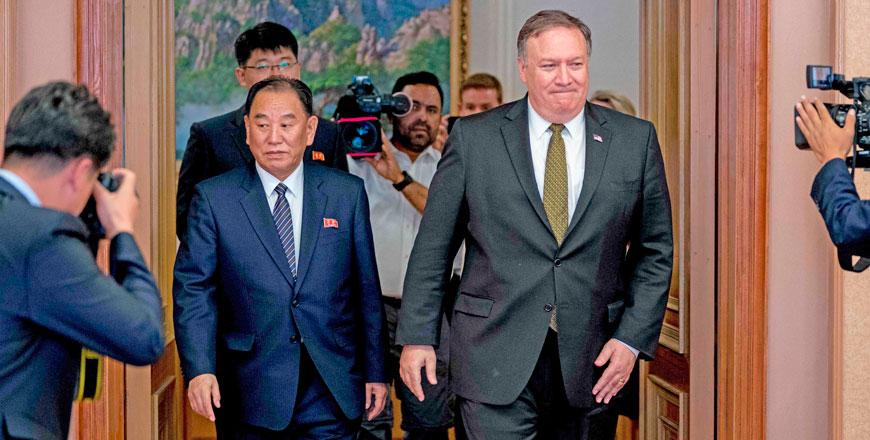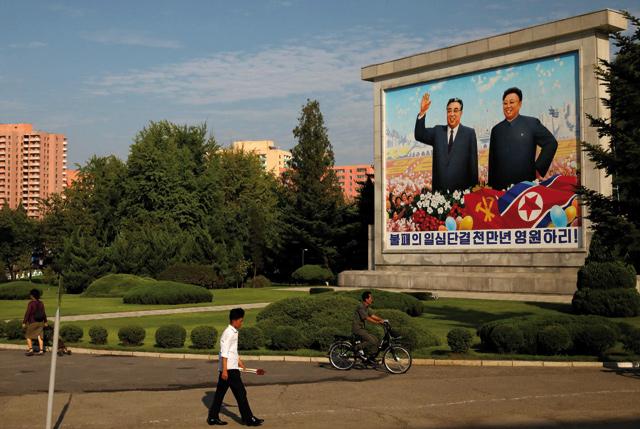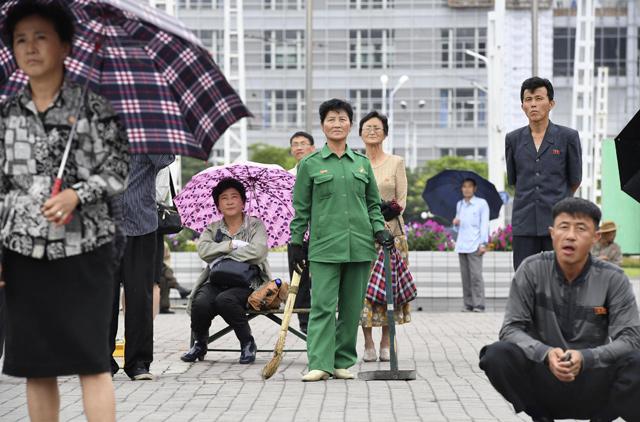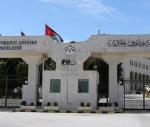You are here
North Korea slams US ‘rapacious’ demands after Pompeo talks
By AFP - Jul 08,2018 - Last updated at Jul 08,2018

US Secretary of State Mike Pompeo (right) and Kim Yong-chol, a North Korean senior ruling party official and former intelligence chief, return to discussions after a break at the Park Hwa Guest House in Pyongyang on Saturday (Reuters photo)
PYONGYANG — North Korea slammed the United States for making "rapacious" demands during critical denuclearisation talks on Saturday, after US Secretary of State Mike Pompeo had earlier described them as "productive".
North Korea’s foreign ministry said the "extremely regrettable" US attitude during the meeting violated the spirit of the agreement reached between leader Kim Jong-un and President Donald Trump last month at their historic summit in Singapore.
"The US attitude and positions at the high-level talks on Friday and Saturday were extremely regrettable," the North's foreign ministry said in a statement, according to South Korea's Yonhap news agency.
It lashed out at the US for its "unilateral and rapacious demands for denuclearisation".
This came just hours after Pompeo had characterised the meeting as a success, but critically without giving many new details as to how North Korea would honour its commitment to "denuclearise" in exchange for US security guarantees.
"These are complicated issues, but we made progress on almost all of the central issues, some places a great deal of progress, other places there's still more work to be done," he said.
Pompeo was speaking after emerging from more than eight hours of talks over two days with North Korean leader Kim Jong-un's right-hand man Kim Yong-chol in a Pyongyang diplomatic compound.
Last month, Kim agreed to "work towards complete denuclearisation of the Korean Peninsula" in return for security guarantees and an end to a dangerous stand-off with US forces.
Trump hailed this as a successful resolution of the crisis, but the short joint statement was not a detailed roadmap to disarmament and it fell to Pompeo to follow up and put meat on the bones of the sparse commitment.
"We talked about what the North Koreans are continuing to do and how it's the case that we can get our arms around achieving what Chairman Kim and President Trump both agreed to, which is the complete denuclearisation of North Korea," he said.
"No-one walked away from that, they're still equally committed," he said, just hours before the North issued their own, less optimistic, view of the negotiations.
In practical terms, Pompeo mentioned only that officials from both sides would meet on July 12 as a working group to discuss the repatriation of the remains of some US soldiers killed during the 1950-1953 Korean War.
He said some progress had been made towards agreeing "the modalities" of North Korea's destruction of a missile facility.
Tring to 'get upper hand'
The North's statement said officials had presented Pompeo with a personal letter to Trump to convey hopes that the "magnificent relations and feelings of trust" between the two leaders would be reinforced in further talks.
Professor Yang Moo-jin at the University of North Korean Studies in Seoul told AFP that Pyongyang was "separating US bureaucrats from President Trump, expressing trust in him".
"This is not to break the talks. The North is trying to get an upper hand in further negotiations," he explained.
"North Korea expected Pompeo to bring a concrete proposal for security guarantee but it was disappointed as the US side reiterated the old demand that the North should denuclearise first before the US gives it anything in return," he said.
Pompeo, who was on his third visit to Pyongyang, began the outreach when he was still Trump's CIA director and remained the pointman on negotiations after the process became public and he became secretary of state.
In comparison to past international nuclear disarmament negotiations, the discussions between Washington and North Korea on thawing ties and dismantling the North's arsenal appear to be proceeding in reverse.
Rather than the two leaders crowning years of detailed negotiation with their one-on-one meeting, the short statement marked instead the start of a diplomatic long slog, and Trump earned the scorn of Korea watchers and non-proliferation experts when he declared the crisis over.
International monitoring
The task of establishing the disarmament programme now falls to Pompeo, who is seeking a formal declaration by the North of the size of its nuclear programme as well as an eventual timetable for it to be ended under international verification and inspection.
Many experts doubt Kim's sincerity — a nuclear deterrent to US intervention has long been a strategic goal of his isolated, autocratic regime — and few expect this to be a quick process, even if Washington wants results within a year.
Related Articles
SEOUL/WASHINGTON — North Korea's Kim Jong-un has given his first time line for denuclearisation, aiming for the end of US President Donald T
SEOUL — A high-level South Korean delegation met with Kim Jong-un in Pyongyang on Wednesday, as Seoul plans a new summit with the North Kore
WASHINGTON — A jubilant-sounding President Donald Trump on Wednesday declared that his "deal" with Kim Jong-un has ended North Korea's nucle



















